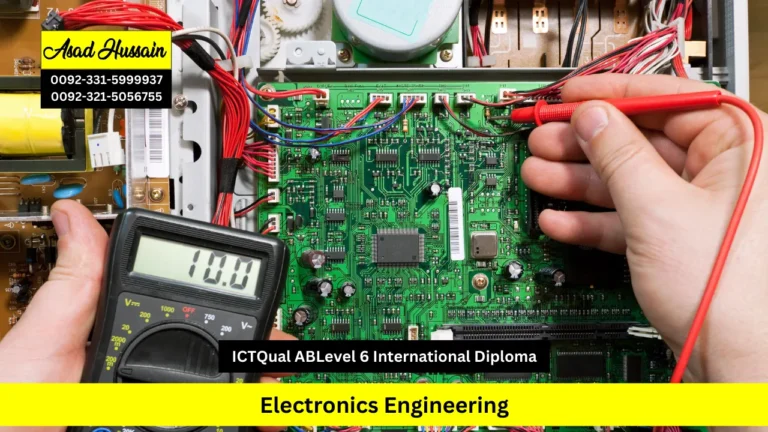In today’s fast-paced world, technology and innovation play a pivotal role in the advancement of industries. One sector that has seen significant growth and development is biotechnology. With its applications across healthcare, agriculture, environmental sustainability, and industrial processes, biotechnology continues to reshape our world. For individuals passionate about this transformative field, the ICTQual Level 5 Diploma in Biotechnology Engineering offers a unique opportunity to advance knowledge and skills, leading to exciting career prospects.
The ICTQual Level 5 Diploma in Biotechnology Engineering is a comprehensive two-year qualification designed to provide students with a solid understanding of the principles, technologies, and engineering practices within the biotechnology sector. This diploma, consisting of 240 credits, serves as an advanced qualification that builds on prior knowledge in engineering, technology, and science. It covers both theoretical and practical aspects of biotechnology engineering, preparing students for the challenges of the modern biotechnology industry.
The ICTQual Level 5 Diploma in Biotechnology Engineering is a powerful qualification that opens up a world of opportunities for those passionate about biotechnology and engineering. With a solid foundation in both theory and practical applications, this qualification prepares students for successful careers in one of the most exciting and rapidly evolving industries in the world. By equipping learners with the necessary skills, knowledge, and practical experience, this diploma sets them on the path to becoming the next generation of biotechnology leaders, innovators, and problem-solvers.
Program Highlights
Year 1:
- Introduction to Biotechnology Engineering
- Molecular Biology and Genetics
- Principles of Biochemistry
- Cell Biology and Biotechnology Applications
- Bioinformatics and Data Analysis
- Bioprocessing Techniques and Technologies
- Genetic Engineering and Recombinant DNA Technology
- Biotechnology Equipment and Instrumentation
- Laboratory Safety and Quality Control
- Microbiology and Biotechnology
- Plant and Animal Biotechnology
- Industrial Biotechnology and Biomanufacturing
Year 2:
- Biostatistics and Experimental Design
- Environmental Biotechnology
- Bioethics and Regulatory Considerations
- Biochemical Engineering Principles
- Protein Engineering and Expression Systems
- Fermentation Technology in Biotechnology
- Bioprocess Control and Optimization
- Biotechnology in Drug Development
- Biotechnology in Agriculture and Food Production
- Biotechnology in Waste Management
- Research and Development in Biotechnology
- Professional Practice and Career Development in Biotechnology
To enroll in the ICTQual Level 5 Diploma in Biotechnology Engineering (240 Credits – 2 Years), candidates must meet the following entry requirements:
- Applicants must be at least 16 years old.
- A minimum of a Level 4 qualification (or equivalent) in a relevant field such as science, engineering, or a technical discipline. This includes qualifications like A-levels, BTEC National Diploma, or other recognized equivalents.
- A strong foundation in subjects such as biology, chemistry, physics, or mathematics is highly recommended to prepare for the course material.
- Although prior experience in biotechnology engineering is not required, applicants should have a general understanding of scientific principles and problem-solving techniques.
- For non-native English speakers, proof of English language proficiency is necessary.
Learning Outcomes for the Level 5 Diploma in Biotechnology Engineering 240 Credits – Two Years:
Year 1 Learning Outcomes:
Introduction to Biotechnology Engineering
- Understand the fundamental concepts and applications of biotechnology engineering in various industries.
- Analyze the role of biotechnology in addressing global challenges such as healthcare, agriculture, and environmental sustainability.
Molecular Biology and Genetics
- Gain a detailed understanding of molecular biology principles and genetic mechanisms.
- Analyze genetic material manipulation techniques, including gene cloning, PCR, and sequencing.
Principles of Biochemistry
- Understand the key biochemical pathways and molecular interactions essential to biotechnology.
- Apply biochemical knowledge to solve problems in biotechnology-related fields.
Cell Biology and Biotechnology Applications
- Learn the structure and function of cells and their relevance to biotechnology applications.
- Evaluate how cell biology influences biotechnological processes such as cell culture and tissue engineering.
Bioinformatics and Data Analysis
- Gain proficiency in bioinformatics tools and techniques to analyze biological data.
- Develop the ability to interpret large-scale genetic and proteomic data sets.
Bioprocessing Techniques and Technologies
- Understand the principles and applications of bioprocessing techniques such as fermentation and cell culture.
- Assess how different biotechnological processes can be optimized for industrial applications.
Genetic Engineering and Recombinant DNA Technology
- Gain knowledge of genetic modification techniques, including the use of recombinant DNA technology in biotechnology.
- Evaluate the ethical, regulatory, and practical implications of genetic engineering.
Biotechnology Equipment and Instrumentation
- Develop skills in the use and maintenance of essential biotechnology laboratory equipment.
- Understand the role of biotechnology instrumentation in research and industrial settings.
Laboratory Safety and Quality Control
- Learn the principles of laboratory safety, good laboratory practices, and quality control in biotechnology.
- Understand the importance of maintaining safety standards to ensure the integrity of biotechnological research and production.
Microbiology and Biotechnology
- Understand the relationship between microbiology and biotechnology in areas such as microbial fermentation, pathogen control, and antibiotic development.
- Analyze the use of microorganisms in industrial biotechnology applications.
Plant and Animal Biotechnology
- Study the biotechnological applications in plant and animal genetics, including gene editing and cloning.
- Assess the potential impact of plant and animal biotechnology on agriculture and medicine.
Industrial Biotechnology and Biomanufacturing
- Understand the role of biotechnology in industrial processes and manufacturing, including the production of biofuels, biochemicals, and pharmaceuticals.
- Evaluate the economic and environmental benefits of industrial biotechnology.
Year 2 Learning Outcomes:
Biostatistics and Experimental Design
- Learn the fundamentals of biostatistics and experimental design to critically analyze experimental data.
- Apply statistical methods to validate biotechnological research results.
Environmental Biotechnology
- Understand the applications of biotechnology in environmental management, including waste treatment, bioremediation, and sustainability.
- Evaluate biotechnological solutions for addressing environmental challenges.
Bioethics and Regulatory Considerations
- Explore the ethical, legal, and regulatory considerations surrounding biotechnological research and applications.
- Analyze current debates related to biotechnology, such as genetic modification and patenting.
Biochemical Engineering Principles
- Understand the principles of biochemical engineering, including enzyme kinetics, mass transfer, and bioreactor design.
- Apply engineering principles to optimize biotechnological production processes.
Protein Engineering and Expression Systems
- Gain knowledge in protein engineering techniques for creating and modifying proteins for specific applications.
- Evaluate the various expression systems used in biotechnology, such as bacterial, yeast, and mammalian cells.
Fermentation Technology in Biotechnology
- Understand the principles and applications of fermentation processes in biotechnology.
- Evaluate fermentation techniques used in the production of biofuels, pharmaceuticals, and other bioproducts.
Bioprocess Control and Optimization
- Learn the techniques for monitoring and optimizing biotechnological processes, including process modeling and control strategies.
- Apply these techniques to enhance efficiency and product quality in biotechnological manufacturing.
Biotechnology in Drug Development
- Understand the role of biotechnology in drug discovery, development, and manufacturing.
- Analyze the potential for biotechnology to create new therapies for a range of diseases.
Biotechnology in Agriculture and Food Production
- Evaluate the role of biotechnology in improving agricultural practices and food production systems.
- Analyze the benefits and challenges of genetically modified crops and animal products.
Biotechnology in Waste Management
- Study the use of biotechnology in managing and reducing waste, including bioremediation and waste-to-energy processes.
- Understand the environmental and economic benefits of biotechnology-based waste management solutions.
Research and Development in Biotechnology
- Gain insight into the research and development process in biotechnology, from concept to commercialization.
- Develop skills in planning, executing, and evaluating biotechnological research projects.
Professional Practice and Career Development in Biotechnology
- Prepare for professional practice in the biotechnology sector by developing career planning, communication, and leadership skills.
- Understand the ethical responsibilities and industry standards in the biotechnology profession.
The ICTQual Level 5 Diploma in Biotechnology Engineering (240 Credits – Two Years) is designed for individuals who are interested in pursuing a career in the rapidly growing biotechnology sector. This course is ideal for:
- Students with a Background in Science or Engineering: Those who have completed a Level 4 qualification (or equivalent) in fields such as science, engineering, or a related technical discipline, and wish to specialize in biotechnology engineering.
- Aspiring Biotechnology Engineers: Individuals who are eager to develop the technical, scientific, and engineering skills required to design, manage, and optimize biotechnological processes in industries like healthcare, agriculture, pharmaceuticals, and environmental sustainability.
- Career Changers: Professionals from other engineering or technical backgrounds who wish to transition into the biotechnology industry and gain the specific skills necessary for biotechnology engineering roles.
- Recent High School Graduates: Students who have completed their A-levels, BTECs, or equivalent qualifications in subjects like biology, chemistry, physics, or mathematics and wish to advance their studies in biotechnology engineering.
- Those Seeking Professional Development: Individuals already working in related industries (such as biomedical sciences or chemical engineering) who want to enhance their skills and knowledge in biotechnology engineering for career progression.
- International Students: Non-native English speakers who meet the English language proficiency requirements and want to pursue a qualification recognized globally, opening up international career opportunities.







